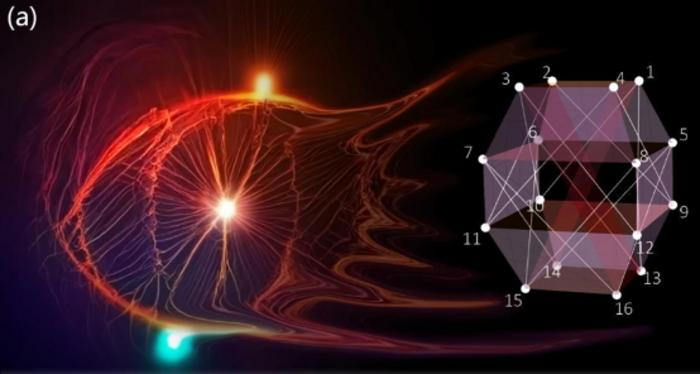
The schematic diagram for extracting contextuality from three-party nonlocality. Image Credit: LIU Zhenghao et al.
They found that the single system exhibits the highest level of quantum contextuality. Physical Review Letters published their study.
Quantum contextuality is the idea that measurements of quantum observables cannot only be thought of as revealing pre-existing values. It is a unique aspect of quantum mechanics and an essential component of quantum computation.
Contextuality challenges hidden-variable theories that do not account for it, and it is intimately related to quantum nonlocality.
The conflict between the hidden-variable theories of contextuality and noncontextuality in multipartite systems gives birth to quantum nonlocality. The Bell inequality violation, which can be used to gauge the degree of nonlocality, has previously been shown to grow exponentially with the number of quantum bits involved.
Despite the fact that single-particle high-dimensional systems provide more measurement options than multipartite systems, the hunt to increase contextual correlation's robustness is still a difficult task.
The researchers used a graph-theoretic approach to quantum correlations to discover more robust quantum contextuality in single-particle systems. They then searched for another set of measures in the single high-dimensional system with commutation relations isomorphic to the graph by associating the commutation relations between measurements utilized in nonlocality correlations with an exclusivity graph.
Using graph parameters, this method completely quantifies the nonclassical characteristics of quantum interactions.
The researchers discovered that using the aforementioned method, they could convert the Mermin-Ardehali-Belinskii-Klyshko (MABK) Bell inequality into a noncontextuality inequality with the same maximum violation but a smaller required Hilbert space dimension.
Further investigation revealed that this contextuality concentration phenomenon, wherein contextuality changes from nonlocality correlations to single-particle high-dimensional correlations, is frequently seen within a class of nonlocality correlations that the researchers had previously uncovered.
In the experiment, the researchers used photon spatial mode encoding to create a spatial light modulation approach for high-fidelity quantum state preparation and measurement in a seven-dimensional quantum system.
They detected a violation surpassing 68 standard deviations in the noncontextuality inequality obtained from the three-party MABK inequality by guaranteeing little disruption between the initial and subsequent observations. The ratio between the quantum violation value and the classical limit hit 0.274, a new high in single-particle contextuality studies.
In addition to laying the groundwork for the observation of additional quantum correlations, the identification of quantum contextuality concentration has the potential to enhance the implementation of quantum computation in a variety of physical systems.
Journal Reference
Liu, Z.- H., et al. (2023) Experimental Test of High-Dimensional Quantum Contextuality Based on Contextuality Concentration. Physical Review Letters. doi:10.1103/PhysRevLett.130.240202.